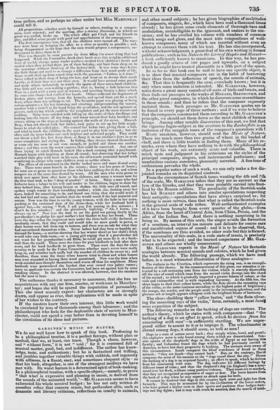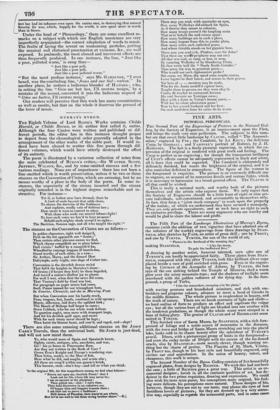GARDINER'S MUSIC OF NATURE.
WE do not well know how to speak of this book. Professing to be a philosophical treatise, it is a perfect farrago, without plan or method, that we, at least, can trace. Though a chaos, however, and" without form," it is not "void ;" for it is crammed full of musical matter, good, bad, and indifferent. The author has know- ledge, taste, and enthusiasm; but he is fantastical and trifling, and jumbles together valuable things with rubbish, and ingenuity with silliness, in a fluent, easy, and sometimes eloquent style- so that his book, altogether, is one of the strangest medleys we have met with. Its worst feature is a determined spirit of book-making. In a philosophical treatise, with a specific object,—namely, to prove "that what is expressive and pleasing in music, is derived from the sounds of the animated world,"—Mr.GARDINER seems to have exhausted his whole musical budget : he has not only written de omnibus rebus that concern music, but quibusdam aliis, such as dramatic and literary criticism, reflections on cruelty to animals, Every musician, however, should read the Mu6ic of Nature. There are much more than two grains of wheat in the bushel of chaff, and there is little trouble in finding them. Many of his re- marks, even where they have nothing to do with the philosophical object of Isis work, are extremely acute and valuable. There is much taste and judgment in his criticisms on the styles of the principal composers, singers, and instrumental performers • and numberless curious anecdotes, pleasantly narrated. A fine time of enthusiasm pervades the whole. In a popular notice of such a work, we can only make a few dis- jointed remarks on its disjointed contents. From the circumstance of Scotch tunes wanting the 4th and 7th of the scale, Mr. GARDINER infers that they are as ancient as the lyre of the Greeks, and that they were probably carried into Scot- land by the Roman soldiers. The peculiarity of the Scottish scale has led BURNEY and others into similar speculations respecting their antiquity,—speculations that have always surprised us ; for nothing is more certain, than that what is called the Scottish scale is the general scale of rude tribes. Well-authenticated examples of it have been brought from every quarter of the globe,—front Africa, from the heart of Central Asia, from China, Persia, and the isles of the Indian Sea. And there is nothing surprising in its being so. By means of this scale, the singer avoids the formation of a semitone, an interval too minute and delicate for coarse ears and uncultivated organs of sound: and it is to be observed, that, if the semitones are thus avoided, no other scale but this isformed. The universality of this scale, in a rude state of music, is precisely what is to be expected.; and the learned conjectures of Mr. GAIL• DINER and others are wholly unnecessary. Mr. GARDINER repeats in the Music of Nature his fantastic analogies between musical sounds and colours, which he had given the world already. The following passage, which we have read before, is a most whimsical illustration of these analogies— The sinfonia in the Creation, which represents the rising sun, is an exempli- fication of this theory. In the commencement of this piece, our attention is at- tracted by a soft streaming note from the violins, which is scarcely discernible till the rays of sound which issue from the second violin diverge into the chord of the second ; to which is gradually imparted a greater fulness of colour, as the viols and violoncellos steal in with expanding harmony. At the fifth bar, the oboes begin to shed their yellow lustre, while the flute silvers the mounting rays of the violin, as the notes continue ascending to the highest point of brightness; the orange, the scarlet, and the purple unite in the increasing splendour, and the glorious orb at length appears refulgent with the brightest beams of harmony.
The oboes shedding their "yellow lustre," and " the flute silver- ing the mounting rays of the violin," form, certainly, a most lama nous exposition of the subject. The following remarks on the barking of dogs are curious. The author's theory, which he states with such composure—that "the barking of a dog is an effort to speak, which he derives from hie associating with man"—is sufficiently startling. We are unpre- pared either to assent to it or to impugn it. The schoolmaster is- abroad among dogs, it should seem, as well as men!
Dogs in a state of nature never bark ; they simply whine, howl, and growl: this explosive noise is only found among those which are domesticated. Son- nini speaks of the shepherds' dogs in the wilds of Egypt as not having this faculty; and Columbus found the dogs which he had previously carried to America, to have lost their propensity to barking. The ancients were aware of this circumstance. Isaiah compares the blind watchmen of Israel to these animals; "they are dumb—they cannot bark." But, on the contrary, David compares the noise of his enemies to the "dogs round about the city. Hence the barking of a dog is an acquired faculty ; an effort to speak, which he derives from his associating with man. The dog indicates Ins different feelings by different tones of voice; and thus the shepherd's dog (in England) has a com- mand over his flock, without using positive violence. Their tones are so marked, that they are recognized as expressive of anger or fear. The horse knows fro= the bark of a dog when he may expect an attack upon his heels. It cannot be doubted that dogs in this country bark more and fight less than i formerly. This may be accounted for by the civilization of the lower orders, who have gained a higher taste in their sports and pastimes than badger-bait- I ings and dog-fights; and it may with truth be asserted, that the march of intel-_,J and other moral subjects ; he has given biogmphieaOf of composers, singers, &c., which have been read a thousand times already; he has given some crude elements of thorough-bass and modulation, unintelligible to the ignorant, and useless to the mu- sician; and he has swelled his volume with numbers of common Scotch songs and glees, and the most trite compositions of well.. known composers, many of which are inserted without even an attempt to connect them with his text. He has also incorporated, without acknowledgment, a great deal of his own writing in former publications; such as his Notes to the Lives of Haydn andlikrozart- a book sufficiently known to musicians. In this way, he has pro- duced a goodly octavo of 500 pages and upwards, on a subject which he might have treated pleasantly in a fifth part of the space. In so far as this book can be said to have any specific object, it is to show that musical composers are in the habit of borrowing their ideas from the inflections of speech, the sounds of animals, and made others melancholy to watch the sports of these town-bred chi dren. &c. That this is frequently the case, everybody knows ; but it is only when some imitation is intended. Mr. GARDINER, however,. notes down a great many sounds of all sorts of birds and beasts, and: then finds out passages in the works of MOZART, BEETHOVEN, and • the other great composers, in which he discovers some resemblance to those sounds; and then he infers that the composer expressly imitated them. Such passages as Mr. GARDINER quotes are to be found in every page of these authors ; and if we were to believe that the composers constructed them according to Mr. GARDINER'S - sisters, sitting on the steps or leaning against the walls of the street. Hannah principle, we should set them down as the most childish of human Bray, when not abroad with her father, took pains to stir up her little neigh- beings. Among other notable discoveries of this sort, we find that hours to what she called play. She coaxed her father into giving them a ball, the vigorous fugue-subject in the overture to the Zauberfli;te is au and tried to teach the children in the next yard to play hide and seek ; but she imitation of the snappish tones of the composer's querulous wife ! often said she never before saw such helpless and awkward people. They could Lferocity for war, which, happily for the world, is now spent more in words than in blows. • Under the head of "Phraseology," there are some excellent re- marks on a subject with which our English musicians are very imperfectly acquainted—the correct adaptation of words to music. The faults of laying the accent on unmeaning particles, putting the musical and rhetorical punctuation at variance, &c., are well exposed. In psalmody, the most absurd and irreverent effects are thus frequently produced. In one instance, the line, "Just like a poor, polluted worm," is sung thus- " Just like a poor poll,
Just like a poor poll, Just like a poor polluted worm."
"But the most profane instance," says Mr. GARDINER, "I ever heard, was the concluding line, 'Jesus and our Sal—vation." In another place, he notices a ludicrous blunder of HANDEL ; who, in setting the line "Give me but her, I'll crowns resign," by a mistake of the accent, converted it into the ludicrous request of "Give me butter, I'll crowns resign."
Our readers will perceive that this work has many eccentricities as well as merits, but that on the whole it deserves the perusal of the lover of music.




























 Previous page
Previous page